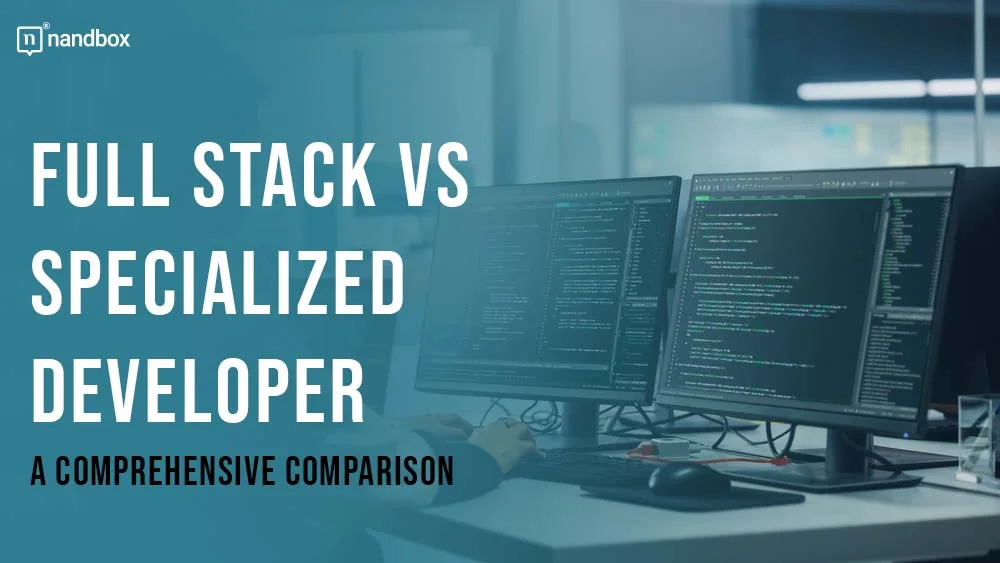The app development process is so great that not only one can do it alone, or can he? This great play has more than you could ever imagine, processes among processes, and many faces of just one big process that we know nothing of. The development process can’t be done with one player; it always needs a team that can collaborate and help finish the final work of art. However, this team can vary significantly depending on the type, purpose, size, etc. Usually, app development projects get torn between two options for choosing teams. I mean, for someone indecisive, this is a nightmare. So, what are the two choices that people get torn between when developing an app? This would have to be the ultimate battle of a full-stack vs. specialized developer.
In this article, we will break down this comparison of full-stack vs specialized developers. We will demonstrate each of the two choices, its pros and cons, and the key factors that businesses rely on when making such a big decision.
What Are Full-Stack Developers?
What comes to mind when you hear the word “full stack”? Personally, I’d like to think of something inclusive and compressive. It can also include many or all elements. This is somewhat true, as full-stack developers are exactly what the name implies. All app development processes are divided into two parts: the front end and the back end. The front end concerns the interface and the part that users will interact with. As per the back end, it contains the “behind-the-scenes” part where the exchange and control of the user input and data exchange happen.
So, what does this have to do with full-stack developers? While each part has to have either front-end or back-end developers, full-stack can do the whole job. Full-stack developers are types of developers or teams who can cover all aspects, as they specialize in more than one area. That is why you could call full-stack developers the jocker, or the wild card that you can rely on in any part of the development process.
Benefits of Hiring a Full-Stack Developer
Hiring full-stack developers can offer several benefits for your organization. Full-stack developers are skilled in both front-end and back-end development, which means they can work on various aspects of a project and contribute to its success in multiple ways. Here are some of the key benefits of hiring full-stack developers:
Versatility
Full-stack developers are valuable members of any team because of their expertise in both front- and back-end systems. The user interface, server-side logic, and other parts of a project are all within their purview. This adaptability can be especially helpful for startups and smaller teams with fewer means.
Efficient Communication
As a result of their comprehensive knowledge of the entire development process, full-stack developers can better convey complex ideas to their colleagues. Together, front-end and back-end developers, designers, and project managers can work more efficiently thanks to their ability to overcome communication barriers.
Cost-Effectiveness

If you need the abilities of two developers but only have the budget for one, consider hiring a full-stack developer. Smaller businesses and projects on a tighter budget may benefit the most from this.
Faster Development
Since full-stack developers are capable of taking on more responsibilities on their own, it is often possible to cut down on the number of developers needed to complete a project. Time-to-market and development cycles for projects may be shortened as a result.
Problem-Solving
Problem-solving is a strength of full-stack developers. When troubleshooting or debugging, having someone who can see the whole development stack and fix problems across it can be invaluable.
Adaptability
The ability to quickly pick up and apply new technologies and tools is essential in the rapidly evolving field of software development. And full-stack developers typically possess these traits.
Drawbacks of Hiring Full-Stack Developers
While hiring full-stack developers has many advantages, there are also some drawbacks to consider. It’s essential to be aware of these potential limitations to make an informed decision when building your development team. Here are some drawbacks to hiring full-stack developers:
Limited Expertise
While full-stack developers are well-rounded, they may lack in-depth knowledge of certain facets of the development process. When working on complex projects that necessitate expertise in areas such as AI, ML, or even just low-level system optimization, this can be a significant drawback.
Workload and Burnout
There is a high risk of burnout for full-stack developers because of the variety of tasks they are expected to complete. It takes a lot of concentration and energy to manage both the front and back ends of a project, as well as design and database duties.
Slower Development for Complex Projects
It’s possible that hiring developers who specialize in a particular area will be more productive for complex and large-scale projects. It may take longer for full-stack developers to complete tasks in these situations.
Higher Risk of Errors
It is possible for full-stack developers to make mistakes or miss problems in areas where they have less experience. Because of this, bugs may be introduced into the code, security may be compromised, and performance may suffer.
Resource Constraints
Due to the greater variety of responsibilities they take on, full-stack developers may occasionally run into resource limitations. If they are overworked, this can cause problems with design quality, scalability, and security.
What Are Specialized Developers?
On the other side of the full stack vs specialized developer comparison are specialized developers. Specialized developers are the exact opposite of full-stack developers in terms of knowledge, skills, specializations, and many more. Unlike full-stack, specialized developers focus on and ace one area instead of many. For instance, if you want a developer to work only on APIs, you’d have to hire a specialized developer in this area only. Because of this and many other reasons, specialized developers are considered to be experts or more professional, as they focus their efforts and knowledge on one area so that they can cover and be aware of all its aspects. As a result, they would produce more effective, precise, and optimal outcomes.
Benefits of Hiring Specialized Developers
Hiring specialized developers who focus on specific areas of expertise within the field of software development can offer various benefits for your organization. Specialized developers have in-depth knowledge and skills in their chosen domain, which can be crucial for complex or large-scale projects. Here are some of the key benefits of hiring specialized developers:
Expertise
Whether it’s front-end or back-end development, mobile app development, data science, or machine learning, specialized developers know their stuff. The work they produce and the problems they solve may both benefit from their expertise.
Efficiency
You can save time and effort by working with a professional who specializes in the field at hand. They know the best methods and tools for their specific field, which can speed up development and problem-solving.
Improved Quality
Developers who specialize in a specific area are better able to produce high-quality code and solutions. They are better at spotting and preventing bugs and security flaws, so the resulting software is more trustworthy and secure.
Scalability
Adding more specialized developers to your team is an efficient way to scale as your project or business grows. Consequently, you’ll be able to better align your abilities with the needs of the project.
Optimal Tool Selection
Experts in a field know exactly which resources and technologies will help them do their job the best. That’s why specialized developers will be able to choose the best stack for your project based on knowledge and experience.
Flexibility
Specialized developers have a better chance of keeping up with the latest innovations and trends in their field. Because of their extensive background in the field, they can quickly grasp and implement novel ideas and methods.
Drawbacks of Hiring Specialized Developers
Narrow Focus
Although they may be experts in their chosen field, developers who specialize in a single area may lack a thorough comprehension of the whole app development process. This can make it difficult to ensure that their efforts are coordinated and integrated with those of other teams working on the project.
Limited Versatility
Full-stack developers may be more adaptable than their specialized peers. They are less likely to take on tasks outside of their area of expertise, which can be a problem in leaner teams or new ventures where adaptability is more important.
Higher Labor Costs
When compared to hiring a small number of full-stack developers who can work across multiple disciplines, the cost of staffing a development team with specialists is often prohibitive. Expertise in a particular field is usually very expensive.
Slower Learning Curve
When it comes to learning new technologies and tools outside of their area of expertise, developers who specialize in a specific area may experience a longer learning curve. Because of this, they might be unable to try out new approaches.
Communication Challenges
It’s not uncommon for specialized developers with niche expertise to have trouble conveying their ideas and needs to the rest of the team. This can lead to miscommunication and unmet expectations.
How Should You Choose Between Full-Stack vs Specialized Developers? Key Factors to Take Into Consideration
At the very beginning, we mentioned that the development team and developers vary significantly based on the project’s requirements. They include size, resources, quality, and many other factors. These factors are a turning point in the process of choosing between a full-stack vs specialized developer. So, let us explore the three most important factors that will help you decide between the two types.
Project Complexity and Size
The first factor in the full-stack vs specialized developer comparison is project complexity and size. These two have a direct proportionality relationship. This means that when one increases, the second will too. The more your project becomes complex and its size increases, the more aspects and areas it will cover. In this case, hiring a full-stack developer would be the more efficient and logical solution, as getting specialized developers for each would be inconvenient and money-consuming.
Budget
As per the budget, it is a crucial factor in the full stack vs specialized developer comparison. Businesses that have a more flexible and open budget usually rely on specialized developers for each part of the development projects. However, businesses with tight budgets, especially start-ups, go with full-stack developers, as they are more cost-effective and can work on any part of the process.
Innovation and Creativity
It is important to consider the level of innovation and creativity required for your project before conducting the full stack vs specialized developer comparison. While full-stack developers may look at the big picture, specialized developers can often bring fresh ideas to bear on a specific problem and focus on coming up with tailored solutions.
What About Being the Developer Yourself, Is It Possible?
So, let us say, just put a hypothesis, that you prefer working alone or would rather start the development process all by yourself. Is this possible in any way? Surprisingly, yes, you can. The technological advancements that have occurred in the app development landscape provide the ultimate solution. This ultimate solution enables developers and individuals to create apps on their own. And this would be no-code and low-code development. The effortless and intuitive nature of these development methods makes it easy and effort-efficient to go through the app development process, with robust and effective apps being the result. For instance, if you want to develop a native app without relying on specialized or full-stack development teams, you can do so using the nandbox app builder. The nandbox app builder is a leading app-building platform that specializes in creating robust native applications.
As we go through a new and advanced world of app and software development, the process becomes more accessible. In addition, the new wave of democratization also makes it easier for any individual to have access to a pool of information, tools, and resources that could help him build as many apps as he wants.





